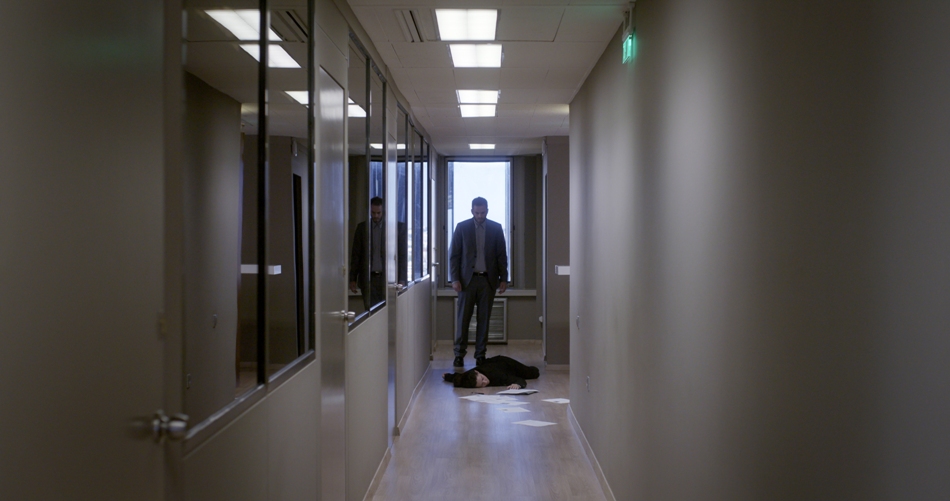
by Amanda Hua
Though it may not seem this way at first, Not to be Unpleasant, but we need to have a serious talk is not the most comfortable film to watch. Directed by Giorgos Georgopoulos and co-written by Georgopoulos and Maria Fakinou, the film introduces us to Aris, who hooks up with girls, drives a big Jeep, and wears a suit to work. He is a man who does manly things. Aris, played unflappably by Omiros Poulakis, seems inoffensive, and one might be lulled into thinking that the film will be a breezy, lighthearted watch about some romantic pursuits gone astray. One might even feel a bit of concern for Aris when he receives a phone call, summoning him to the hospital.
We find out quickly that Aris has a sexually transmitted disease which does not affect him but will spontaneously kill any woman he has had sex with in the past four years. And thus begins Aris’ journey to remember and track down his former lovers in order to notify them, always relying on his faithful Jeep Wrangler to get him from girl to girl. As each woman is folded into the story, we feel more and more unsettled. Not to be Unpleasant, but we need to have a serious talk is a film about a man’s journey, but at its heart the film speaks on responsibility and the harsh consequences of toxic masculinity.
As Aris takes us on a tour of his past lovers, we meet a wide array of women. The first is a maid, and the next is the CEO of a cosmetics company. One woman is an employee working underneath Aris, and yet another is the daughter of his boss. One of the last women we meet is a woman living with her son out of the city. Aris’ callousness progressively becomes more apparent as we see how each of these women is uniquely vulnerable and how Aris has carelessly played with their lives.
An especially appalling moment in the film occurs when we discover that Anka, the daughter of Aris’ boss, is a young teenage girl. She is scarcely more than a child. Even the women who are in “powerful” positions, such as Eugenia, the CEO, are implicitly destabilized in the mise-en-scène. At one point in the film, Aris observes Eugenia from outside of her home, gazing at her through a large glass wall made up of multiple panes. The resulting effect is that she is caged in and powerless. Even before the women knew about their imminent deaths, their lives had already been derailed by this man who had walked into their lives, taken what he wanted, and then walked out without a second thought. It is astonishing how Aris has managed to leave so much wreckage in his wake without ever being held accountable.
As Georgopoulos takes us through Aris’ exploitative relationships with his former lovers, the director further explores toxic masculinity by weaving the idea of showmanship into several scenes. Eugenia judges a male bodybuilder competition, and Zoe runs a dog show for German Shepherds. Aris himself is a salesman. These moments in the film reflect the performative need for men in our society to put on a front. They flaunt and show off, like contenders in a bodybuilding competition or dog show, trying to sell themselves as strong and powerful. The showmanship intermingles with Aris’ womanizing tendencies to define masculinity. Sex and strength seem to be the ideals of manliness. Sincerity and vulnerability, on the other hand, detract from this, which we see in the many shots of Aris’ carefully composed face and stoic demeanor.
Another star of the film is Aris’ Jeep Wrangler. The film begins with a shot of Aris standing on the right side of his car. He is not centered in the frame. Rather than Aris being the focus of the shot, he and his Jeep are given equal weight. Later on, Georgopoulos films Aris at a close shot distance while he sits in the driver’s seat. Aris spends a large proportion of his screen-time in this position as he drives from woman to woman or stares through his windshield at someone, and the frontality of the image visualizes the male gaze. Aris is always sitting in the driver’s seat, in control of the car.
In the second act of Burning, Lee Chong-dong’s film that similarly portrays characters damaged by toxic masculinity, we also find male characters frequently in the driver’s seat of their car, stalking and observing others. The car empowers these characters in a way, enabling them to do what they want. For Aris, his car represents mobility and agency, which the women in his life lack. Often, Aris drives the women around in his car. When one woman dies, she falls from a building and lands on a car, her body shattered by the impact, and the image of the woman’s broken body sprawled on top of the car communicates, without words, the film’s point about the danger posed to women by toxic masculinity.

The film shifts during a scene in which he talks to a past lover and a massive balloon resembling a clownfish floats next to his head, reminiscent of the llama scene in Lucrecia Martel’s Zama. The balloon ridicules the situation and Aris, a man who is painfully unaware of his own blunders and insensitivity. Soon afterward, Aris’ car window is struck with a shotgun, and his Jeep is finally broken. This is the point where his demeanor begins to change, and in the last few moments of the film, vulnerability and accountability faintly emerge in Aris.
It is at the end of the film when we meet Yuki, played by Mari Yamamoto, who is the last woman that Aris needs to track down. Her presence holds weight and we see how it has been threaded throughout the film, despite her character’s brief screen time. We sense that she is different. When she leaves Aris, she walks towards her own car, revealing her agency and mobility that the other women lacked. In the film’s concluding moments, Aris is portrayed in a long shot from a very high angle, undermining the control and power he had for so much of the film. Finally, Aris stands to the right of his car again, but now, his car is broken, and something about him is broken as well.
I had the privilege of watching Not to be Unpleasant, but we need to have a serious talk at the Austin Film Festival this year, where this film really stood out. An important role of films is to hand a microphone to and shine a spotlight on people we don’t normally hear from or see. These are the marginalized and the minorities, and it’s incredible that so many films screened at the Austin Film Festival highlight these groups. A black man on death row as well as a young, inexperienced black lawyer are placed at the center of Destin Daniel Cretton’s Just Mercy. Yellow Rose, a film directed and co-written by Diane Paragas, tells the story of an undocumented Filipina girl and her deported mother. Terrence Malick’s A Hidden Life is about a conscientious objector who was ostracized for refusing to swear allegiance to Hitler, and whose actions and heroism are known by few. These films put forth the message that there is importance and worth in the lives of people who might exist out of sight and out of mind for many of us. They teach us compassion and understanding, and they remedy the years of ignorance and lack of representation.
Not to be Unpleasant, but we need to have a serious talk, on the other hand, is a film focused on a white, privileged man who does not seem capable of accepting full responsibility for the harm he inflicts on other people. Other characters in the film are literally dropping dead around him. Why would we want to shine more of a spotlight on people who are represented by characters like Aris? I think that films like Georgopoulos’ hold people like Aris accountable. The spotlight is not given to Aris to empower him, but rather to emphasize the collateral damage that results from his actions. While the focus is on Aris, the women are given names and stories. As the story progresses, the women are given more emphasis, while Aris is undermined. And as Aris is destabilized and broken down, we begin to see more of his humanity, peeking out through the cracks in his facade of brutal masculinity.